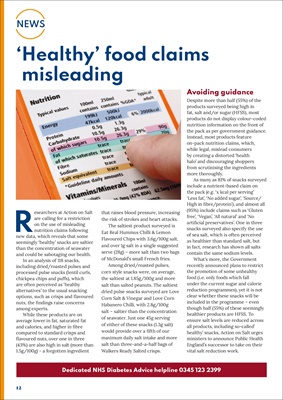
12
NEWS
Dedicated NHS Diabetes Advice helpline 0345 123 2399
' Healthy' food claims
misleading
Researchers at Action on Salt
are calling for a restriction
on the use of misleading
nutrition claims following
new data, which reveals that some
seemingly 'healthy' snacks are saltier
than the concentration of seawater
and could be sabotaging our health.
In an analysis of 118 snacks,
including dried/roasted pulses and
processed pulse snacks (lentil curls,
chickpea chips and puffs), which
are often perceived as 'healthy
alternatives' to the usual snacking
options, such as crisps and flavoured
nuts, the findings raise concerns
among experts.
While these products are on
average lower in fat, saturated fat
and calories, and higher in fibre
compared to standard crisps and
flavoured nuts, over one in three
(43%) are also high in salt (more than
1.5g/100g) - a forgotten ingredient
that raises blood pressure, increasing
the risk of strokes and heart attacks.
The saltiest product surveyed is
Eat Real Hummus Chilli & Lemon
Flavoured Chips with 3.6g/100g salt,
and over 1g salt in a single suggested
serve (28g) - more salt than two bags
of McDonald's small French fries.
Among dried/roasted pulses,
corn style snacks were, on average,
the saltiest at 1.85g/100g and more
salt than salted peanuts. The saltiest
dried pulse snacks surveyed are Love
Corn Salt & Vinegar and Love Corn
Habanero Chilli, with 2.8g/100g
salt - saltier than the concentration
of seawater. Just one 45g serving
of either of these snacks (1.3g salt)
would provide over a fifth of our
maximum daily salt intake and more
salt than three-and-a-half bags of
Walkers Ready Salted crisps.
Avoiding guidance
Despite more than half (55%) of the
products surveyed being high in
fat, salt and/or sugar (HFSS), most
products do not display colour-coded
nutrition information on the front of
the pack as per government guidance.
Instead, most products feature
on-pack nutrition claims, which,
while legal, mislead consumers
by creating a distorted 'health
halo' and discouraging shoppers
from scrutinising the ingredients
more thoroughly.
As many as 81% of snacks surveyed
include a nutrient-based claim on
the pack (e.g. 'x kcal per serving'
'Less fat', 'No added sugar', 'Source/
High in fibre/protein'), and almost all
(95%) include claims such as 'Gluten
free', 'Vegan', 'All natural' and 'No
artificial preservatives'. One in three
snacks surveyed also specify the use
of sea salt, which is often perceived
as healthier than standard salt, but
in fact, research has shown all salts
contain the same sodium levels.
What's more, the Government
recently announced plans to restrict
the promotion of some unhealthy
food (i.e. only foods which fall
under the current sugar and calorie
reduction programmes), yet it is not
clear whether these snacks will be
included in the programme - even
though half (55%) of these seemingly
healthier products are HFSS. To
ensure salt levels are reduced across
all products, including so-called'
healthy' snacks, Action on Salt urges
ministers to announce Public Health
England's successor to take on their
vital salt reduction work.